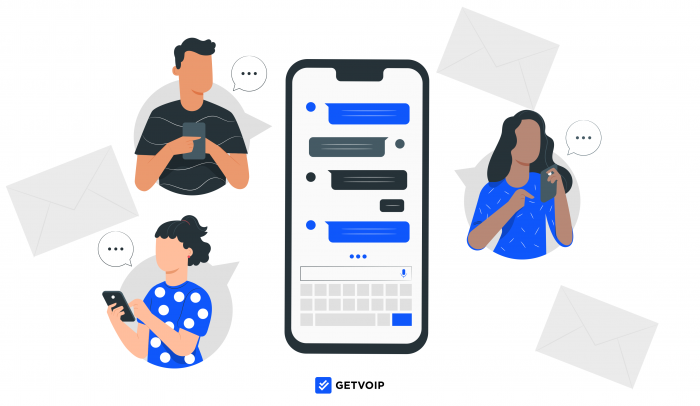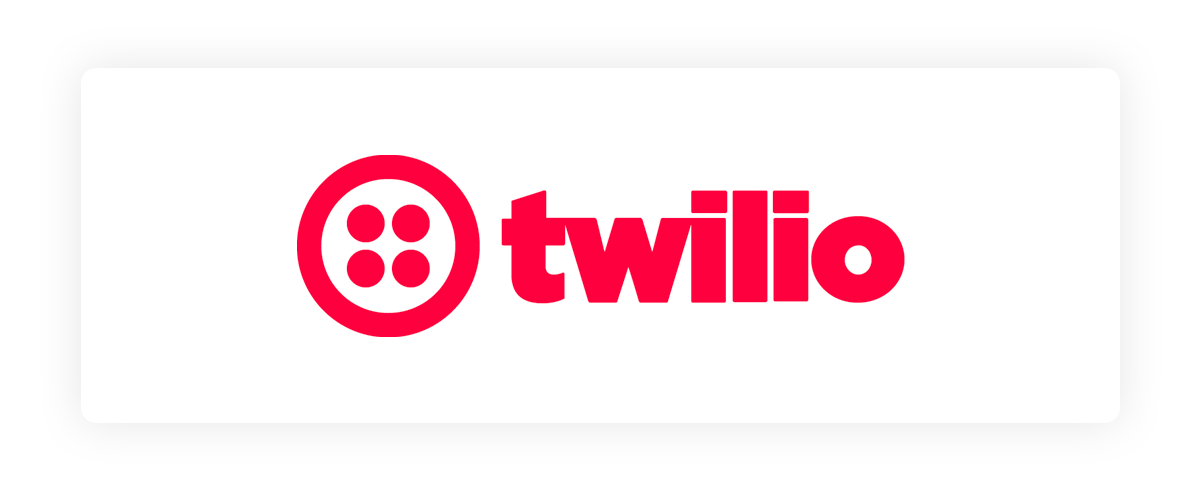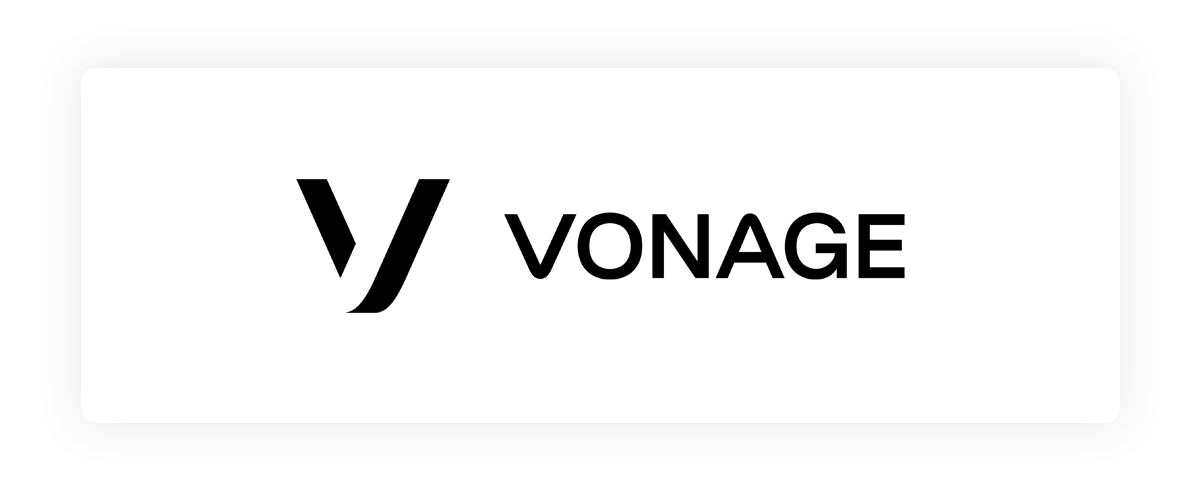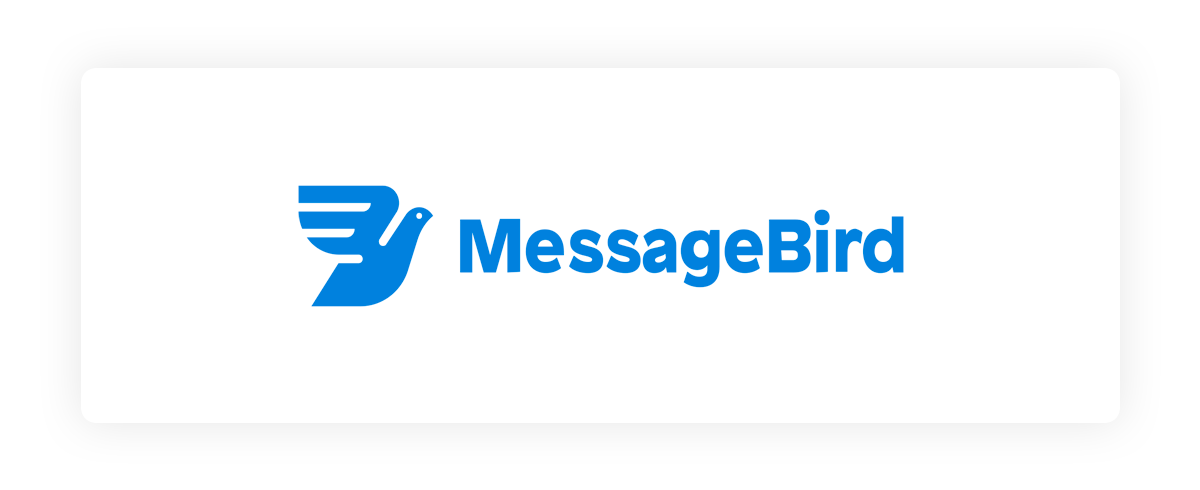Rich Communication Services (RCS) expand on the functions that you would find in standard SMS or MMS, which is the most well-known multimedia texting system.
In this guide, we’re going to show you how rich communication services work and hit on some of its strengths and weaknesses. We will cover the following sections:
- What is Rich Communications Services?
- What Makes Rich Communications Services Unique?
- Business Benefits of Rich Communication Services
- CPaaS Providers with RCS Messaging APIs
- The Pros and Cons of Rich Communications Services
- RCS Messaging vs SMS vs MMS
- FAQs
What is Rich Communications Services (RCS)?
Rich communication services (RCS) is a type of text-based protocol for mobile devices that was designed as a replacement for SMS and MMS messaging. RCS allow users to create group chats with friends, send images and videos, get read receipts, and have support for end-to-end encryption. Also, there’s no 160-character limit as with regular SMS.
Rich communication services first appeared in 2007 and was adopted by the Global System for Mobile Communications (GSMA) in 2008. It is available to Google Android users, and in December 2019, several U.S. carriers, including Verizon, AT&T, Sprint, and T-Mobile, committed to supporting the protocol.
RCS messaging works via mobile data or Wi-Fi, so if the recipient doesn't have cell service but they are on a wireless network, you still have the ability to send them messages without a problem.
What Makes Rich Communications Services Unique?
Rich Communications Services (RCS) don't use the same file formats as SMS or MMS. Besides the text transmission features, RCS messaging protocol allows users to send multiple data types such as pictures, videos, location data, pdf files, and even Microsoft Word documents. Customers can also complete transactions within the messaging app.
While it does have some security concerns, one feature that a business will find valuable is sender verification. With this feature, any texts a business sends will have to be verified first. That way, customers won’t have to worry about being spammed by third parties pretending to be their favorite brands. When a message is sent, the recipient will see the verified sender’s information – not just the phone number.
Business Benefits of Rich Communication Services
Rich communication services are convenient for the average user, but how does it provide new opportunities for your business?
More Interactive Messaging
One of the best benefits of rich communications services is the file size. Unlike SMS and MMS, RCS messaging has a file size limit that spans into megabytes, not kilobytes. This means that you will be able to send more multimedia content to your customers, such as audio and video.
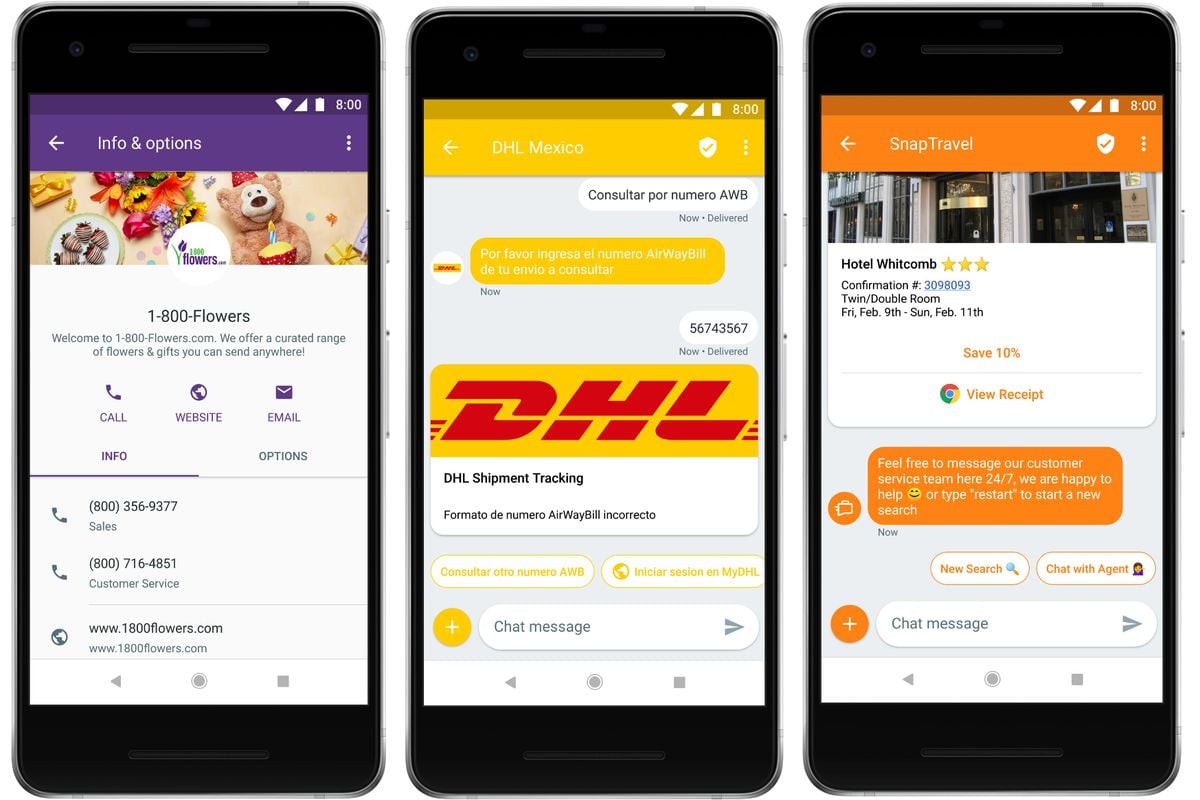
Image source: https://www.theverge.com/
Consider this: with traditional messaging, you can send a small .jpeg or .gif image to your customers, perhaps with a link, but is this enough to engage them?
With RCS, your messages can have high-definition images, clickable buttons, and branding, which will create a more browser-like messaging experience. Rich communication services provide a much more detailed user experience, which results in better engagement.
One-App Functionality
Rich communication services also bring the ability to complete entire transactions right inside the messaging app. Instead of providing a link that opens in a mobile browser, RCS messaging handles all of the functionality on their own. Without the need to change software, this creates a universal profile for users.
While browsing through an app like Samsung Messages, the customer can select different color options for the product and click various sizes. Once they’ve selected the variation of the product that they want, rich communication services app allows them to complete the transaction by providing their payment and mailing details.
This is another way of increasing engagement by making things more convenient for customers. Instead of waiting for pages to load on their browser app, they can complete a transaction inside their rich communication services-enabled applications.
Easy Feature Integration
You’ll be able to integrate various features into your software easily. For example, chatbots are useful for helping customers navigate through menus. They also save money because there’s no need to involve your agents when self-service is enough. It’s easy to implement inside RCS software, and you can use a FAQ-style setup or incorporate AI to help your customers receive resolution.
Additionally, since this messaging easily sends location data, brands send information to the customer through the messaging app that will tell them how to reach their nearest brick and mortar location. This is also useful for those receiving deliveries since purchasing, shipping, and delivery confirmation are all possible with the messaging application.
Better Verification
With features like branding and sender verification, customers will know it’s your business that’s sending them communications/offers. That's because once the sender is verified, branding will be consistent across the board. That'll make for a better all-around customer experience.
Read receipts also help businesses better keep track of messages sent to customers. For example, you can use it for collection activities. When you send a message about a late payment, you will always know that the customer received and read it — that's because RCS messaging offers rich analytics capabilities comparable to web analytics tools.
CPaaS Providers with RCS Messaging APIs
Communications platform as a service (CPaaS) providers help your developers add messaging APIs to your applications so you can extend your communications channels. This lets your customers reach your brand in ways that they find convenient. Remember, modern customers typically use more than three touchpoints to reach a brand. This means that you have to find the one with the best messaging features to meet your customers' needs.
Here are some providers that include APIs for messaging. These will make reaching out to Android users on the mobile operators that support the system easier.
Twilio
Twilio is a CPaaS provider that makes it easy to send messages to customers. Even though there are lots of great Twilio alternatives, Twilio is still a great option for businesses that are looking to upgrade their customer experience by switching to RCS messaging. Their options are scalable so that messages are deliverable across the globe, and they have an uptime guarantee of 99.95%. Twilio also has an RCS app with a drag-and-drop builder that can be used to customize your messages to create a better user experience for customers.
Messaging APIs available through Twilio
- SMS
- MMS
- RCS
Vonage
A few years ago, Vonage acquired Nexmo to create a CPaaS provider that delivers strong options for businesses to send messages globally. Vonage's Communications APIs options let you change the type of messaging that you are creating based on the needs of the customer. This will ensure that videos and audio files are sent to customers quickly without sacrificing quality.
Messaging APIs Available through Nexmo
- SMS
- MMS
- RCS
- Facebook Messenger
- Viber
Sinch
Sinch has messaging capabilities that provide an app-like experience that will make customers more comfortable. You will be able to send images, audio, and video files in these messages as well as create and customize the message to make an interactive experience for your brand. You will know when messages are received and whether the customer is sending a response back. If this kind of messaging fails with Sinch, there is a failover that will change your message into either an MMS or an SMS message to ensure that it is still sent.
Messaging APIs Available through Sinch
- SMS
- MMS
- RCS
- Verified SMS
- Telegram
- Kakao Talk
- LINE
- Apple Messages for Business
Kaleyra
With Kaleyra messaging, you don’t have to worry that audio and video files are incompatible with the MMS messaging system that you use. This messaging delivers a unique branding experience that customers will enjoy and a faster response rate when messages are sent. RCS messaging will help you build the trust of your customers and track their engagement with your brand.
Messaging APIs Available through Kaleyra
- SMS
- MMS
- RCS
MessageBird
MessageBird’s rich communication services aim to help customers modernize their messaging experience. This includes the ability to create custom branding through advanced interactive elements. Like its competitors, MessageBird’s platform allows for rich media to enhance conversations with things like images, videos, maps, and buttons.
Messaging APIs available through MessageBird
- SMS
- MMS
- RCS
Infobip
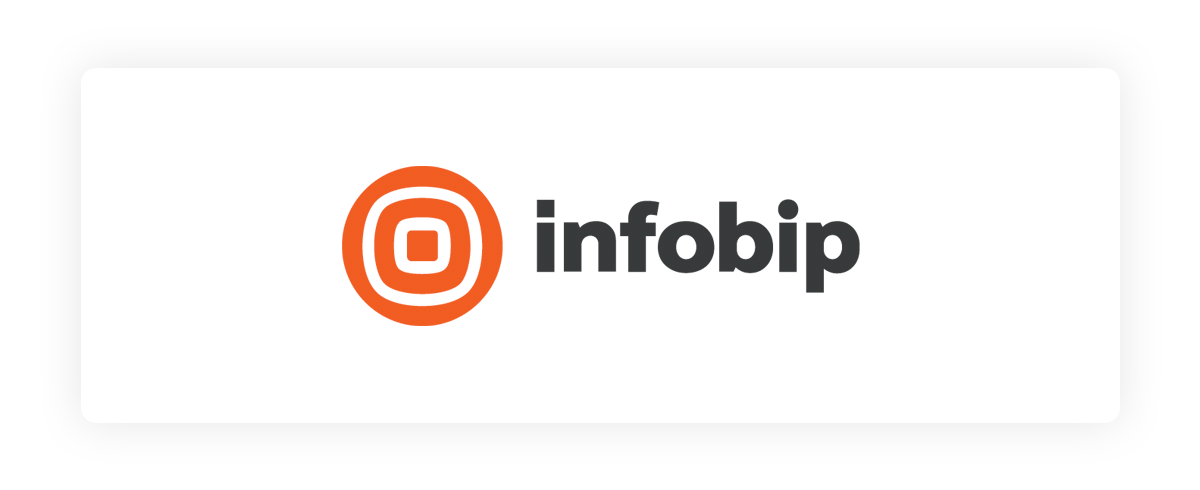 Infobip has gained the trust of prominent brands such as Google and Papa John’s with its RCS Business Messaging platform. Along with custom branding and rich media cards, Infobip features embedded clickable buttons for easy responses and actions along with carousels that allow users to combine up to 10 rich cards into a single interactive unit.
Infobip has gained the trust of prominent brands such as Google and Papa John’s with its RCS Business Messaging platform. Along with custom branding and rich media cards, Infobip features embedded clickable buttons for easy responses and actions along with carousels that allow users to combine up to 10 rich cards into a single interactive unit.
Messaging APIs available through Infobip include:
- SMS
- MMS
- RCS
- WhatsApp Business
Google Jibe

Google Jibe lets carriers and OEMs build a solid messaging experience with rich communication services. You can engage and retain your existing users with features like high-resolution photos, larger file sharing, group chats, read receipts, and more. Google also offers the Jibe Hub, which provides mobile operators with an easy connection to the global RCS network.
Messaging APIs Available through Google Jibe:
- SMS
- MMS
- RCS
The Pros and Cons of Rich Communications Services
There are multiple benefits that make rich communication services great for business. Let’s take a look.
- You can send higher-quality images and larger messages.
- Location sharing is integrated into the messaging app as well as other group chat features that are useful when sending a message.
- Video calling is supported by default.
- You can send and receive documents with a customer that you're already messaging.
- You can use calendar integrations for scheduling meetings and invoice integrations for scheduling payments.
- You can create a web-like experience for customers. Instead of just text, limited images, and links, you can brand your texts, add image carousels, and add clickable links to your messages.
RCS messaging is far from perfect. There are aspects that fall behind other types of messaging that may prevent a business from using it. Here are some weak points to consider when it comes to RCS messaging.
- RCS messages do not have built-in end-to-end encryption.
- RCS messaging only functions with a mobile phone number, so devices like tablets and standard Microsoft Windows and Apple desktop computers are not compatible.
- The service is still relatively new, so it’s not available through all carriers at this point.
- iPhone devices do not support this type of messaging with Android users. Non-iOS users can only send standard SMS messages to Apple devices.
RCS Messaging vs SMS vs MMS
To give you a better idea of what rich communication messaging offers, take a look at this comparison chart so you can decide whether to use SMS, MMS, or RCS messaging.
| SMS | MMS | RCS | |
| Character limit | 160 | 160 | 8,000 |
| Connection requirements | Cellular connection | Cellular connection | Cellular connection or Wi-Fi |
| Message receipt confirmation | No | No | Yes |
| Messaging capabilities | Text, links, and emojis | Text, links, emojis, images, video files, audio files, and contact cards | Text, links, emojis, images, video files, audio files, contact cards, and data files |
| File size limitations | N/A | 300KB (MMS 1.2) and 600KB (MMS 1.3) | 10MB |
| Mobile platforms | Any smartphone | Any smartphone | Android smartphones |
Is RCS Messaging a Valid Successor to SMS?
Rich communication services provide you with key features that help you reach customers where they are most comfortable – in their favorite messaging app.
Looking for additional ways to connect with your customer base? Check out our breakdowns of the best call center software solutions on the market.
Rich Communication Services FAQs
Below, we've answered some FAQs about RCS messaging.

